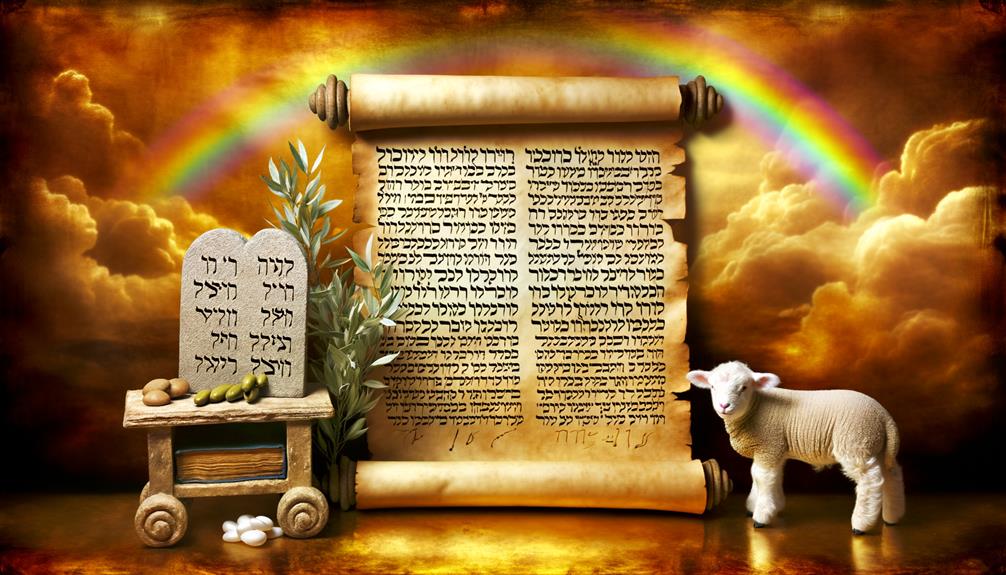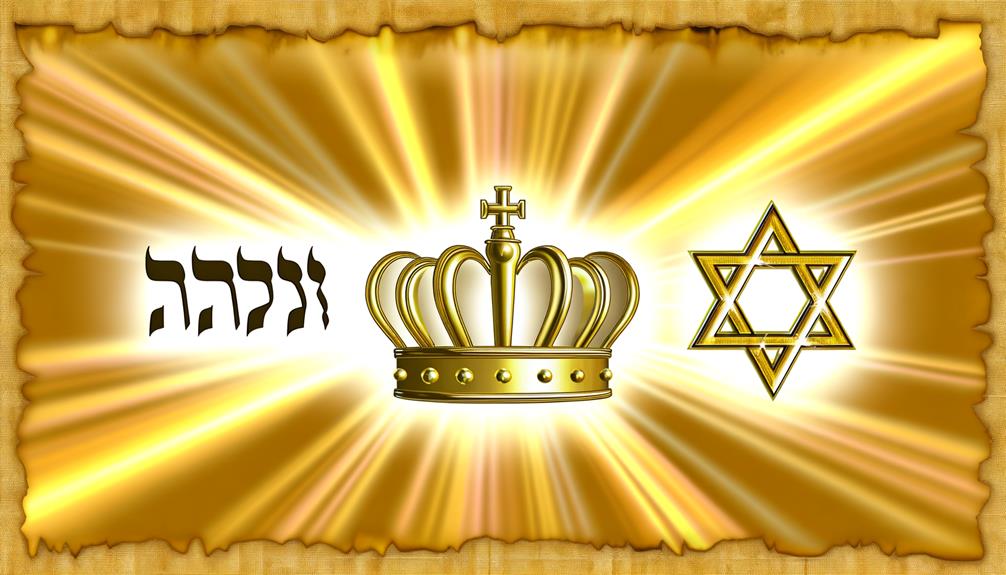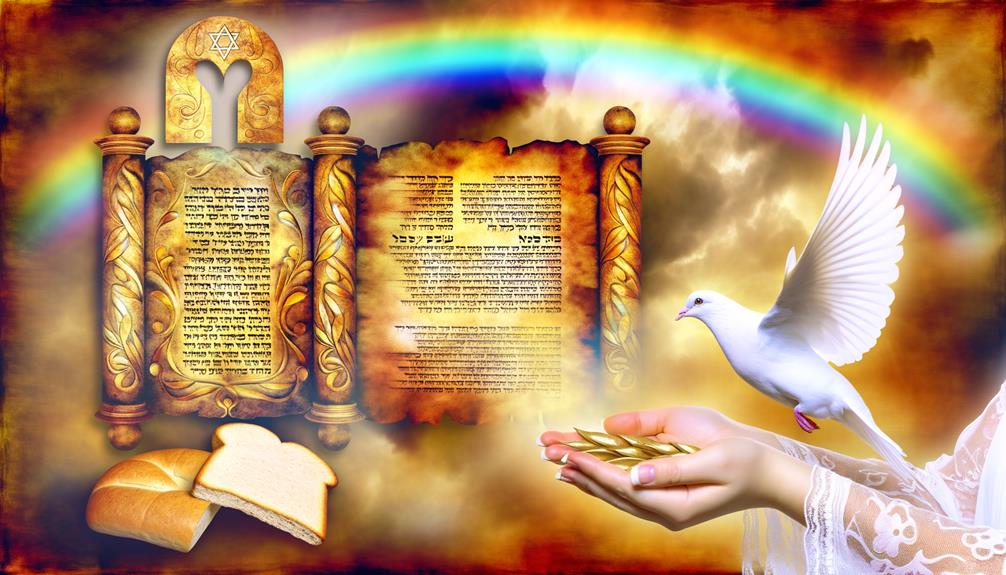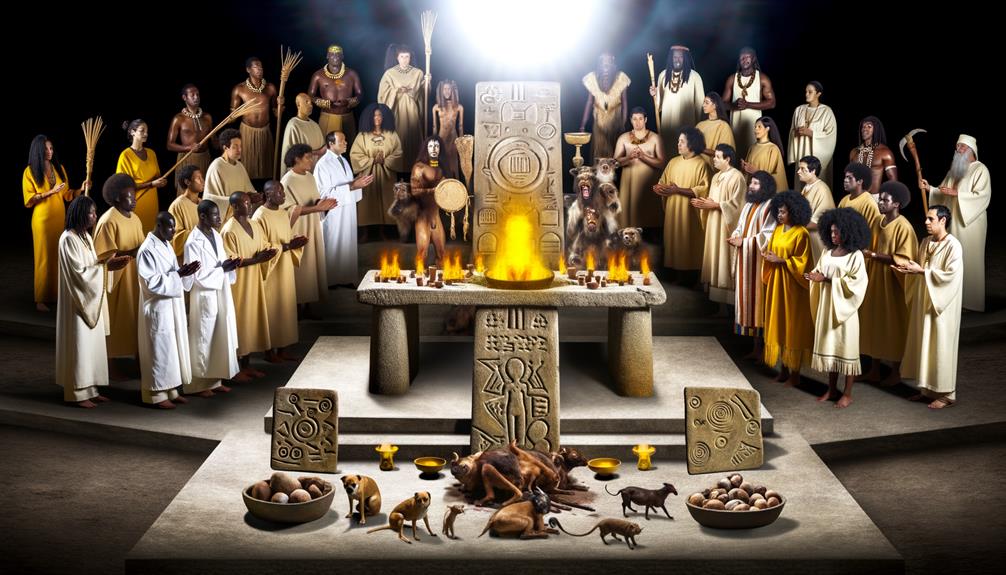Meaning of the Word Covenant in the Bible: Sacred Agreement
In the Bible, the word ‘covenant’ refers to a solemn, binding agreement with profound religious and social implications, derived from the Hebrew ‘berith’ and Greek ‘diatheke.’ This concept underscores sacred commitments between God and humanity, marked by irrevocability and eternal significance. Covenants in the Old and New Scriptures, such as the Abrahamic, Mosaic, and New Covenants, include stipulations, oaths, and symbolic acts like circumcision and blood sacrifices.
These agreements shape biblical narratives and theological frameworks, emphasizing divine fidelity and human responsibility. For a deeper understanding, exploring various types and their theological ramifications will be enlightening.

Meaning of the Word Covenant in the Bible: Definition and Significance
| Aspect | Description |
|---|---|
| Definition | A sacred agreement or promise between God and humans |
| Hebrew Term | Berith – meaning bond or alliance |
| Greek Term | Diatheke – meaning testament or will |
| Key Examples | Noahic Covenant, Abrahamic Covenant, Mosaic Covenant, New Covenant |
| Significance | Represents God’s faithfulness and relationship with His people |
| Purpose | To establish divine promises and moral obligations |
| Symbolic Signs | Rainbow (Noah), Circumcision (Abraham), The Cross (New Covenant) |
Definition and Origin

The term ‘covenant,’ originating from the Hebrew word ‘berith’ and the Greek word ‘diatheke,’ refers to a solemn and binding agreement or contract, often with profound religious and social implications in the biblical context.
This concept is not merely a legal arrangement but encompasses a sacred commitment endorsed and witnessed by the divine.
Unlike modern contracts, biblical covenants often include stipulations, oaths, and ceremonial acts designed to establish a deep, enduring relationship between the parties involved.
The etymology underscores the gravity and sanctity associated with these covenants, highlighting their role in shaping moral and spiritual conduct.
Their divine endorsement further distinguishes them, embedding within them a sense of irrevocability and eternal significance.
Covenants in the Old Testament

The Old Testament presents a series of pivotal covenants that shape the theological and historical narrative of the Hebrew Scriptures, especially the Abrahamic and Mosaic covenants.
The Abrahamic Covenant establishes a foundational promise of land, progeny, and blessing, serving as a cornerstone for Israel’s identity and relationship with God.
In contrast, the Mosaic Covenant, encapsulated in the giving of the Law at Sinai, underscores a conditional relationship based on adherence to divine commandments, consequently highlighting the dynamic interplay between divine promise and human responsibility.
Abrahamic Covenant Overview
Central to the narrative of the Old Scriptures, the Abrahamic Covenant establishes a foundational framework for understanding God’s promises and relationship with His chosen people.
This covenant, articulated primarily in Genesis 12, 15, and 17, encompasses several key promises: land, progeny, and blessings. God pledges to make Abraham the father of a great nation, to grant his descendants the land of Canaan, and to bless all nations through him.
This unconditional covenant, marked by divine initiative, reveals a transcendent vision of divine-human partnership.
The Abrahamic Covenant’s enduring significance lies in its role as a theological precursor, shaping subsequent redemptive history and elucidating the nature of God’s covenantal fidelity and overarching salvific plan.
Mosaic Covenant Significance
Integral to the theological tapestry of the Old Scriptures, the Mosaic Covenant underscores the profound legal and spiritual dimensions of Israel’s relationship with God.
This covenant, established at Mount Sinai, is foundational for understanding Israel’s identity and divine mission. It articulates a thorough legal code, encapsulated in the Ten Commandments and expanded through extensive laws governing moral, civil, and ceremonial life.
Functioning as a bilateral agreement, it delineates blessings for obedience and curses for disobedience, thereby framing Israel’s communal and individual ethos.
The Mosaic Covenant is pivotal not only for its immediate legalistic implications but also for its eschatological significance, prefiguring the New Covenant and foreshadowing the ultimate reconciliation between humanity and the divine.
Abrahamic Covenant

Rooted in the divine promises made to Abraham, the Abrahamic Covenant represents a foundational aspect of biblical theology and serves as a pivotal moment in the narrative of God’s relationship with humanity.
This covenant, detailed in Genesis 12, 15, and 17, encompasses promises of land, descendants, and blessings.
Significantly, it is characterized by its unilateral nature, emphasizing God’s sovereign commitment.
The covenant’s implications extend beyond Abraham, impacting the entire lineage of Israel and, by extension, all nations.
The sign of circumcision (Genesis 17:10-14) symbolizes this enduring pact.
Mosaic Covenant

Building on the foundational promises to Abraham, the Mosaic Covenant introduces a more detailed and structured framework for Israel’s relationship with God, as depicted in the books of Exodus, Leviticus, Numbers, and Deuteronomy.
This covenant, often referred to as the Sinai Covenant, is characterized by an extensive set of laws and commandments, including the Ten Commandments, which serve as ethical and ritual guidelines for the Israelites.
Central to this covenant is the mutual commitment: God pledges to be Israel’s God, and Israel agrees to obey His laws.
The covenant is ratified through a sacrificial ceremony (Exodus 24), symbolizing the binding nature of this divine-human agreement.
Consequently, the Mosaic Covenant underscores the conditional aspect of Israel’s covenantal relationship with God.
Davidic Covenant

The Davidic Covenant, articulated primarily in 2 Samuel 7, represents a pivotal divine promise that establishes David and his descendants as the perpetual rulers of Israel, consequently introducing a messianic expectation deeply embedded in the theological narrative of the Bible.
This covenant encompasses both a dynastic promise and a theological assurance, ensuring the continuity of David’s lineage and its ultimate fulfillment in an everlasting kingdom.
The intricate theological implications of this covenant influence subsequent biblical prophecies and eschatological hopes, emphasizing divine sovereignty and the legitimacy of Davidic kingship.
This covenant not only underpins Israel’s historical and political framework but also shapes the messianic ideology, portraying the anticipated deliverer as a descendant of David, thereby reinforcing God’s unwavering commitment to His chosen line.
New Covenant in Jesus

The New Covenant in Jesus represents a profound shift in biblical theology, emphasizing His sacrificial role as the ultimate atonement for humanity’s sins.
This covenant not only fulfills ancient prophecies but also introduces a paradigm of grace and redemption, distinct from the Mosaic Law.
Through Jesus, believers access a transformative relationship with God, grounded in forgiveness and eternal life.
Jesus’ Sacrificial Role
Central to the New Covenant in Jesus is His sacrificial role, which redefines the relationship between humanity and the divine by fulfilling the promises and requirements set forth in the Old Scripture covenants.
In theological terms, Jesus’ atoning sacrifice on the cross serves as the ultimate expiation for sin, effectively bridging the chasm between God and mankind.
By offering Himself as the unblemished Lamb, Jesus fulfills the sacrificial system delineated in the Mosaic Covenant, rendering animal sacrifices obsolete.
This pivotal act establishes a new paradigm of grace and redemption, where faith in Jesus’ sacrifice supersedes adherence to the Old Covenant’s legalistic ordinances.
Hence, His sacrifice is not merely a component of the New Covenant but its foundational cornerstone, ensuring eternal reconciliation.
Fulfillment of Prophecies
Rooted in the rich tapestry of Old Scripture prophecy, the New Covenant in Jesus emerges as the fulfillment of divine promises articulated through the writings of prophets like Jeremiah and Isaiah. These prophecies, which foretold a new relationship between God and humanity, find their ultimate realization in the life and ministry of Jesus Christ. This New Covenant is characterized by internal transformation and a direct, personal relationship with God, as opposed to the external observances of the old alliance.
| Prophets | Old Testament References | Fulfillment in Jesus |
|---|---|---|
| Jeremiah | Jeremiah 31:31-34 | Hebrews 8:8-12 |
| Isaiah | Isaiah 42:6, 49:8 | Luke 22:20 |
| Ezekiel | Ezekiel 36:26-27 | John 3:5-6 |
| Daniel | Daniel 9:24-27 | Matthew 26:28 |
This table illustrates the seamless connection between prophetic anticipation and New Agreement fulfillment.
Grace and Redemption
Grace and redemption, hallmarks of the New Covenant in Jesus, encapsulate the transformative shift from adherence to the Law towards the unmerited favor and salvation offered through faith in Christ.
This paradigm shift fundamentally alters the believer’s relationship with God, focusing not on legalistic observance but on the internalization of divine grace.
The New Covenant, prophesied in Jeremiah 31:31-34 and realized in the New Agreement, underscores God’s initiative in restoring humanity through Jesus’ sacrificial death and resurrection.
Ephesians 2:8-9 articulates this grace as a gift, not earned by works, therefore nullifying human boasting.
Redemption through Christ’s atonement signifies liberation from sin’s bondage, presenting a renewed covenantal framework predicated on relational intimacy and divine mercy.
Symbolism and Significance

The concept of a covenant in the Bible is imbued with profound symbolism, representing a sacred and binding agreement between God and humanity that carries significant theological and moral implications.
This divine-human pact is often sealed with a physical sign—such as the rainbow in the Noahic Covenant or circumcision in the Abrahamic Covenant—symbolizing God’s unwavering promises.
The covenant framework underscores the seriousness of divine commitments, portraying God as a reliable partner in the covenant relationship.
Additionally, it serves as a moral compass, guiding human behavior in alignment with divine will.
Theologically, covenants highlight God’s grace and faithfulness, offering a paradigm through which believers interpret divine-human interactions and the unfolding of redemptive history across biblical narratives.
Conditional Vs. Unconditional

Distinguishing between conditional and unconditional covenants in the Bible reveals a nuanced understanding of divine promises and human obligations within the covenantal framework.
Conditional covenants, such as the Mosaic Covenant, hinge on mutual responsibilities; God’s blessings are contingent upon Israel’s adherence to the law.
Unconditional covenants, like the Abrahamic and Davidic covenants, emphasize God’s sovereign initiative and unwavering commitment, irrespective of human action.
These covenants manifest divine grace, as seen in God’s promise to Abraham of land, descendants, and blessing, independent of Abraham’s future actions.
Similarly, the Davidic Covenant guarantees a perpetual dynasty regardless of individual kings’ fidelity.
Consequently, these distinctions illuminate the interplay between divine sovereignty and human responsibility in biblical theology.
Covenant Rituals

Covenant rituals in the Bible serve as tangible manifestations of divine agreements, often involving blood sacrifices that underscore the solemnity and binding nature of these pacts.
Symbolic acts, such as the cutting of animals or the exchange of garments, further illustrate the depth of commitment between the parties involved.
Additionally, ritualistic meal sharing embodies a profound sense of fellowship and mutual obligation, reinforcing the relational aspects of biblical covenants.
Blood Sacrifice Significance
Blood sacrifice in biblical covenants serves as a profound ritual underscoring the gravity and sanctity of the promises made between God and humanity. The shedding of blood symbolizes life itself and highlights the seriousness of the covenantal agreement. This act carries significant theological implications:
- Atonement: Blood sacrifices serve to atone for sins, establishing a reconciled relationship between the parties involved.
- Commitment: The irrevocable nature of bloodshed emphasizes the binding commitment of the covenant.
- Sanctification: The act purifies and consecrates both the covenant and its participants.
- Foreshadowing: These rituals often prefigure the ultimate sacrifice of Jesus Christ, which fulfills and transcends earlier covenants.
Through these elements, blood sacrifices encapsulate the depth and solemnity inherent in biblical covenants.
Symbolic Covenant Acts
Ancient biblical covenants often involved symbolic acts that vividly illustrated the terms and significance of the agreements between the divine and human parties.
One prominent ritual was the cutting of animals, seen in the Abrahamic covenant (Genesis 15), where divided animal carcasses symbolized the severe consequences of breaking the covenant.
Another ritual was the exchange of garments or personal items, signifying the mutual sharing of identities and resources, as seen in the Davidic covenant with Jonathan (1 Samuel 18:3-4).
These acts served not merely as formalities but as profound, tangible expressions of commitment and obligation.
Through these rituals, the abstract principles of covenantal relationships were concretized, fostering a deeper understanding and a more solemn adherence to the divine-human pacts.
Ritualistic Meal Sharing
Ritualistic meal sharing, often seen in biblical covenants, functioned as a profound act of fellowship and mutual commitment between the covenanting parties, reflecting the intimate and binding nature of these sacred agreements. This practice underscores several key elements:
- Solidarity: It signifies unity and harmony between the participants.
- Ratification: The shared meal serves as a tangible confirmation of the covenant.
- Divine Presence: Such meals often symbolized God’s presence and blessing.
- Perpetuity: The act highlighted the enduring nature of the covenant relationship.
In the context of biblical narratives, these meals were not mere social gatherings but were imbued with deep theological significance, reinforcing the covenant’s solemnity and the participants’ unwavering commitment to their promises.
Impact on Believers Today

The concept of covenant in the Bible profoundly shapes the ethical framework and relational dynamics of contemporary believers, serving as a foundational paradigm for understanding their commitments to both God and community. Emphasizing mutual obligations, covenants underscore the gravity of divine-human relationships and inspire accountability. Believers today perceive these covenants as timeless agreements that structure their moral responsibilities and communal interactions.
| Aspect | Impact on Believers Today |
|---|---|
| Ethical Framework | Guides moral decisions |
| Relational Dynamics | Enhances community bonds |
| Divine Commitments | Strengthens faith in God’s promises |
| Mutual Obligations | Promotes accountability |
| Timeless Agreements | Guarantees continuity of faith |
Covenantal principles, as a result, provide a robust foundation for steering through modern ethical and relational landscapes.
Conclusion
In the vast tapestry of biblical narratives, covenants emerge as the threads binding divine promises to human faithfulness.
These sacred agreements, whether conditional like the Mosaic or unconditional like the Davidic, serve as beacons of divine intention and human responsibility.
Through rituals and symbols, the essence of these covenants permeates the lives of believers, shaping their spiritual journeys.
Consequently, the covenantal framework is the loom upon which the relationship between the divine and humanity is meticulously woven.






